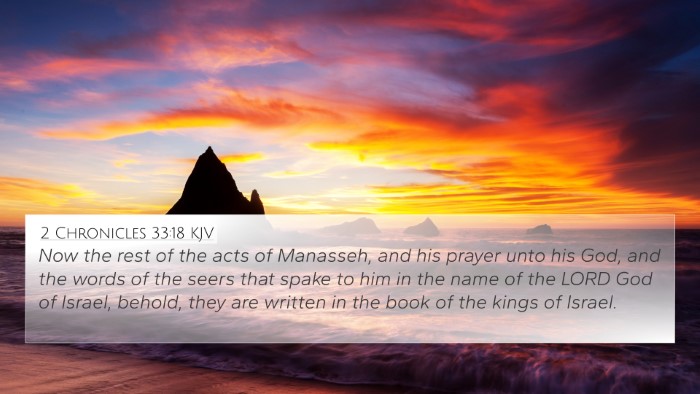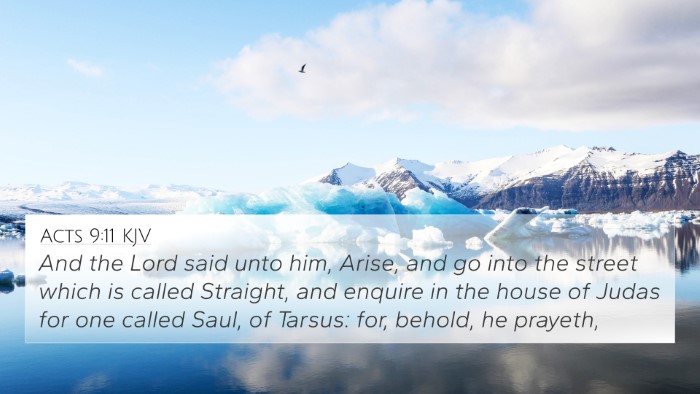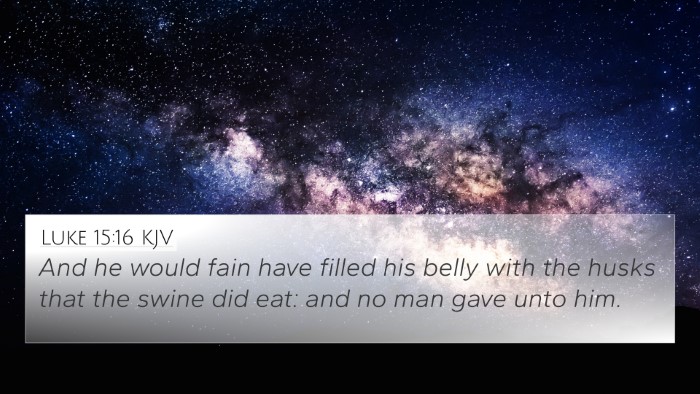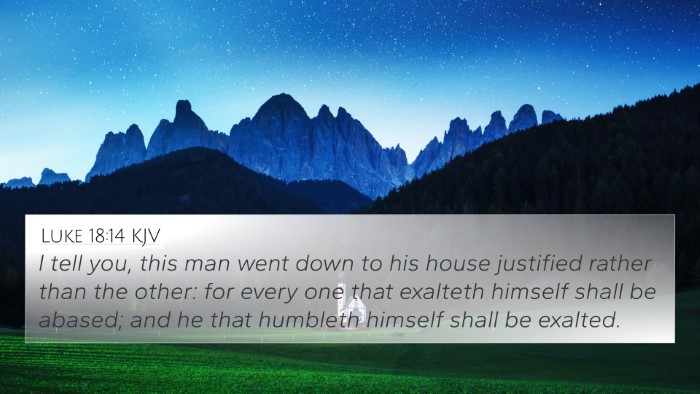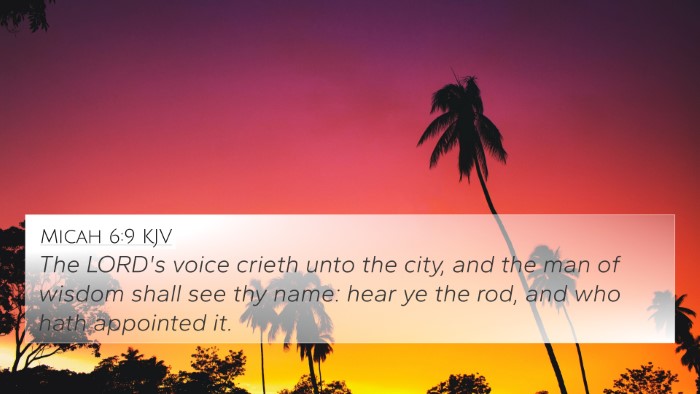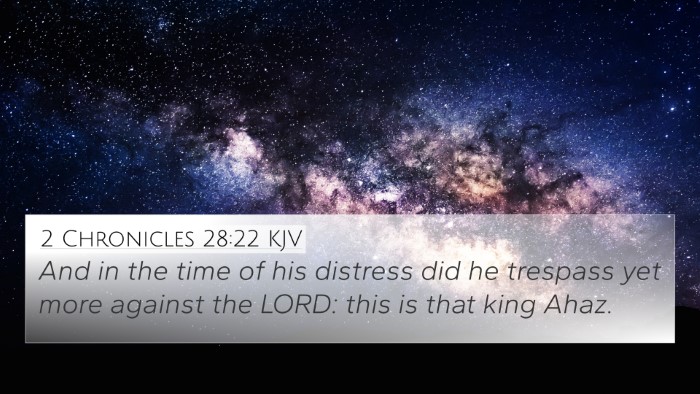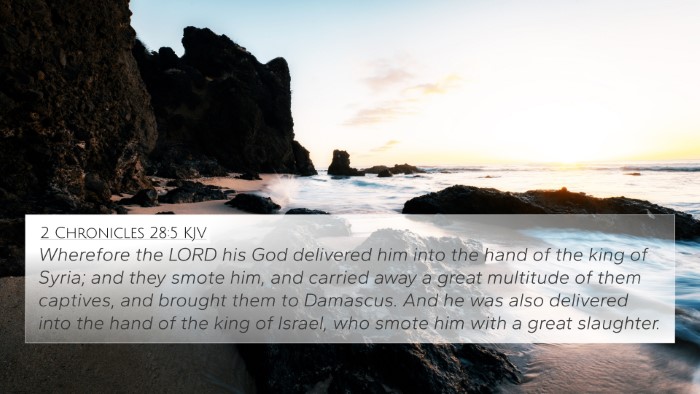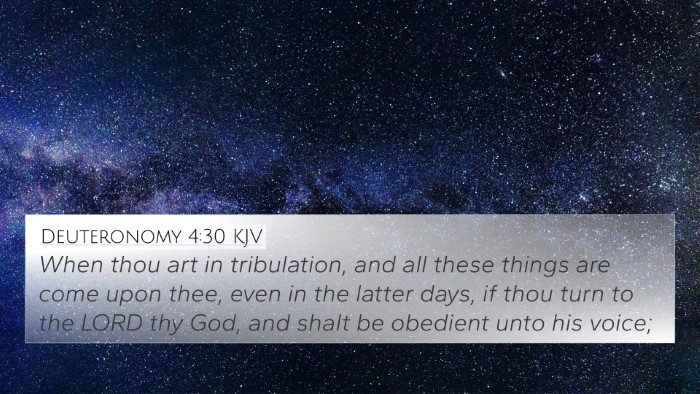Understanding 2 Chronicles 33:12
The verse 2 Chronicles 33:12 states:
"And when he was in affliction, he besought the LORD his God, and humbled himself greatly before the God of his fathers."
Overview
This verse highlights the profound turn of heart experienced by Manasseh, the king of Judah. After pursuing a life of rebellion against God, the severe consequences of his actions led him to seek God's mercy. This moment illustrates the principle of repentance and the power of divine forgiveness.
Key Insights from Commentaries
Matthew Henry's Commentary
Henry emphasizes that despite Manasseh’s grave sins, when he faced dire affliction, it prompted him to call upon God. This act of humility is significant—it shows that even a king, when brought to the depths of despair, can recognize his need for divine assistance. Henry notes that God is always ready to hear the prayers of those who truly repent.
Albert Barnes' Notes on the Bible
Barnes elaborates on the nature of Manasseh’s affliction, which he suggests was likely a consequence of the Assyrian captivity. In his distress, Manasseh turned to the God of his ancestors, highlighting the importance of returning to one’s roots and the faith of one’s forebearers. Barnes points out the significance of humbling oneself and seeking forgiveness, underscoring that true repentance often arises from suffering.
Adam Clarke's Commentary
Clarke interprets this verse as a pivotal moment in Manasseh’s life, demonstrating that in times of crisis, individuals may come to a clearer understanding of their actions. He suggests that Manasseh’s humility was not merely a superficial plea but a deep acknowledgment of his wrongdoing. Clarke stresses the transformative power of seeking God, which offers hope for renewal and restoration.
Bible Verse Cross-References
- Psalm 51:17: "The sacrifices of God are a broken spirit; a broken and contrite heart, O God, you will not despise."
- Luke 18:13: "But the tax collector stood at a distance. He would not even look up to heaven, but beat his breast and said, 'God, have mercy on me, a sinner.'
- 2 Chronicles 7:14: "If my people, who are called by my name, will humble themselves and pray and seek my face and turn from their wicked ways, then I will hear from heaven."
- Isaiah 55:7: "Let the wicked forsake their ways and the unrighteous their thoughts. Let them turn to the LORD, and he will have mercy on them."
- James 4:10: "Humble yourselves before the Lord, and he will lift you up."
- 1 John 1:9: "If we confess our sins, he is faithful and just to forgive us our sins and to cleanse us from all unrighteousness."
- Proverbs 3:34: "He mocks proud mockers but shows favor to the humble and oppressed."
- Matthew 11:28: "Come to me, all you who are weary and burdened, and I will give you rest."
- Hebrews 4:16: "Let us then approach God’s throne of grace with confidence, so that we may receive mercy and find grace to help us in our time of need."
- Jonah 2:2: "He said: 'In my distress I called to the LORD, and he answered me. From deep in the realm of the dead I called for help, and you listened to my cry.'
The Thematic Connections
The themes of repentance, affliction, and divine mercy are prevalent throughout the Bible. 2 Chronicles 33:12 serves as a poignant reminder that no matter how far a person has strayed, the pathway back to God lies in genuine humility and repentance.
Scriptural Cross-Referencing
Scriptural cross-referencing allows for a deeper understanding of biblical texts. The connections between 2 Chronicles 33:12 and the verses listed above illustrate a consistent biblical narrative focusing on the need for humility and the assurance of God's mercy.
Inter-Biblical Dialogue
Through the lens of inter-Biblical dialogue, we can see how various scripture passages enrich our understanding of repentance and compassion. They highlight the relational aspect between humanity and God, inviting us to explore how themes resonate across both the Old and New Testaments.
Conclusion
Manasseh's story exemplifies the transformative power of repentance. His cry for mercy demonstrates that the path to reconciliation with God is always open, irrespective of the sins committed. As you study this passage and utilize tools for Bible cross-referencing, may you discover deeper connections within Scripture that illuminate God's enduring faithfulness.





